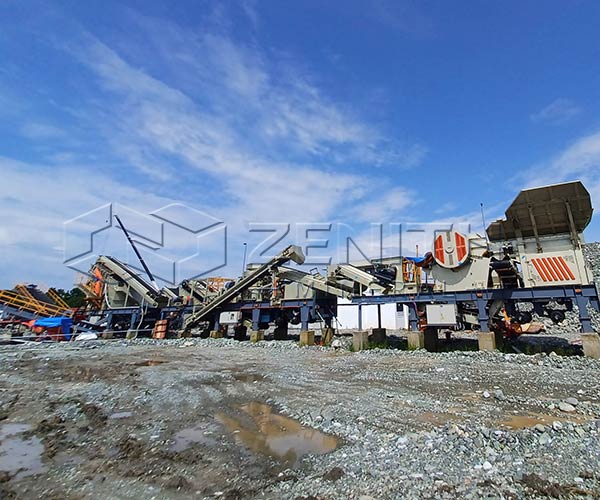Understanding the Growing Demand for Mobile Crushers in the Philippines
The Philippines is experiencing rapid infrastructure development, driving demand for efficient crushing solutions in construction, mining, and recycling sectors.
Mobile crushers offer flexibility and mobility, allowing on-site processing of materials and reducing transportation costs for aggregates and construction waste.
Their ability to handle diverse materials—such as granite, limestone, marble, and even construction debris—makes them a preferred choice for contractors and quarry operators.
Main Types of Mobile Crushers Available in the Philippine Market
Designed for primary crushing, these units feature robust jaw chambers and wide feed openings (up to 1200mm), suitable for processing large rocks and quarry materials. Common models range from 800x500mm to 1000x650mm, with output capacities between 100-600 TPH.
Ideal for secondary crushing, these machines handle soft to medium-hard materials (like limestone and coal) with throughputs up to 400 TPH. They are preferred for producing uniform aggregates and recycling applications.
Used for tertiary crushing, these crushers produce well-shaped, fine aggregates and sand. Models with cone shell diameters between 350-700mm can deliver 150-400 TPH, ensuring precise size control for construction and manufacturing needs.
Often paired with crushers, mobile screening units classify and separate finished product sizes, increasing overall efficiency. These can be integrated with crushing modules or operated as standalone units.
Key Features and Benefits of Mobile Crushers for Philippine Users
- Portability: Easily moved between sites, minimizing setup time and maximizing productivity, especially in remote or changing project locations.
- Integrated Systems: Most mobile crushers combine feeding, crushing, screening, and conveying into one unit, streamlining operations and reducing the need for multiple machines.
- Diesel Engine Options: Many units offer diesel-powered alternatives, catering to areas with limited access to electricity—an important consideration in rural or developing regions.
- Customizable Configurations: Equipment can be tailored to specific needs, such as material type, desired output size, and required capacity, ensuring optimal performance for each project.
Top Mobile Crusher Models Popular in the Philippines
- PE Series Mobile Jaw Crusher: Known for its large crushing ratio, simple structure, and reliable performance. Suitable for a wide range of materials, including granite, basalt, and limestone. Capacities range from 45-800 TPH, with input sizes up to 1020mm.
- PEW Series Mobile Jaw Crusher: Features advanced hydraulic design and enhanced stability. Models like PEW860 and PEW760 offer capacities from 15-500 TPH, with feeding sizes up to 720mm.
- C6X Series Mobile Jaw Crusher: Represents a leap in crushing technology with world-class structure and efficiency. Handles input sizes up to 1200mm and capacities up to 1500 TPH, making it ideal for large-scale operations.
- Impact and Cone Mobile Crushers: Various brands offer impact and cone models with capacities tailored for secondary and tertiary applications, producing high-quality aggregates and manufactured sand.
Price Ranges and Factors Affecting Mobile Crusher Costs in the Philippines
- General Price Range: Mobile crushers in the Philippines are priced from approximately $10,000 for small units to over $1,000,000 for high-capacity, advanced models.
- Entry-Level Models: Small mobile jaw crushers and basic impact crushers typically cost between $10,000 and $30,000, ideal for small-scale projects or startups.
- Mid-Range Options: Medium-capacity units, suitable for most construction and quarrying needs, are priced from $30,000 to $60,000.
- High-End Crushers: Large, fully integrated mobile crushing plants with advanced automation and screening capabilities can exceed $100,000, with some models reaching up to $1,000,000.
- Local Listings: Online marketplaces like Carousell list new diesel-powered mobile jaw crushers for as low as PHP 484,590 (around $8,500), reflecting the availability of affordable options for budget-conscious buyers.
Factors Impacting Price:
- Brand and manufacturer reputation
- Machine size, capacity, and power requirements
- Level of automation and integrated features
- After-sales support, warranty, and availability of spare parts
How to Choose the Right Mobile Crusher for Your Project Needs
- Assess Material Type and Hardness: Ensure the chosen crusher can handle the specific materials—such as granite, limestone, or construction waste—common to your operations.
- Determine Required Capacity: Match the crusher’s throughput (TPH) to your project’s production targets for optimal efficiency.
- Consider Site Conditions: For remote or off-grid sites, prioritize models with diesel engines or hybrid power options.
- Evaluate After-Sales Support: Reliable after-sales service and readily available spare parts are crucial for minimizing downtime and maintaining productivity.
- Compare Multiple Offers: Shop around, compare specifications, and review customer feedback before making a purchase to ensure the best value for your investment.
Mobile Crushers as a Smart Investment in the Philippines
- Mobile crushers provide unmatched flexibility, cost-efficiency, and productivity for construction, mining, and recycling operations in the Philippines.
- With a wide range of models and price points, there is a suitable mobile crusher for every scale of operation—from small contractors to large quarry operators.
- By carefully considering project requirements, material types, and budget, buyers can select the ideal mobile crusher to boost their operational success in the dynamic Philippine market.

